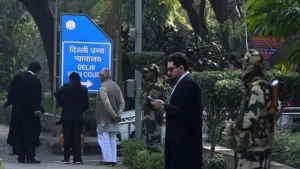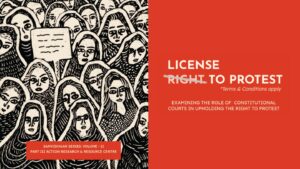Author: Joicy Milun Zou
Case Overview: Kavita’s struggle to continue education
Kavita, a 14-year-old student from a modest, working-class family, faced significant hurdles in her pursuit of education. Her father, Deepak, worked as a driver and was the sole provider for the family. Kavita had been attending the private school, Shiksha Mandir, from Nursery through the eighth grade. In 2022, Kavita’s mother was diagnosed with acute kidney failure, necessitating expensive medical care. Given the financial strain on the family, it was decided that Kavita would transition to a government-run school.
However, in 2023, Shiksha Mandir refused to issue Kavita a Transfer Certificate (TC), citing non-payment of tuition fees, including outstanding amounts from the COVID-19 period. The refusal to provide the TC barred Kavita from being admitted to the government school in Delhi, which follows a strict protocol requiring a TC for new admissions. As a result, Kavita lost an entire academic year and faced the possibility of her education being permanently disrupted.
Legal Framework: Right to Education Act (RTE)
The Right to Education Act (RTE) (attached with this post) aims to protect children from being denied access to education. The 86th Amendment of December 2002 introduced Article 21A into the Constitution of India, guaranteeing free and compulsory education for children aged six to fourteen. This amendment laid the foundation for the Right of Children to Free and Compulsory Education Act, 2009 (hereafter referred to as “the Act”), which details the right to education and the process for obtaining a TC.
Key sections of the RTE Act relevant to this case include:
- Section 2(c) defines a child as any individual between the ages of six and fourteen.
- Section 2(f) outlines elementary education as education from first through eighth grade.
- Section 3 guarantees the right to free and compulsory education for all children between the ages of six and fourteen, including those from disadvantaged groups, in a neighbourhood school without any fees.
- Section 4 ensures that children who have missed out on schooling can be placed in age-appropriate classes with special training provided to help them catch up.
- Section 5 directly addresses the issue of transfer certificates, stating that schools must issue a TC upon request, and delays in issuing the TC should not prevent the child from securing admission elsewhere. Moreover, school authorities could face disciplinary action for any delays in providing the TC.
The limitation of RTE, in this case:
Unfortunately, by the time Kavita’s case escalated, she had already crossed the age of 14. Furthermore, she required admission to the ninth grade, which falls outside the scope of the RTE Act, as its provisions are limited to children up to age 14 and for admissions only through the eighth grade. Thus, the Act’s enabling provisions could not directly assist Kavita.
Intervention by lawyers from Part III Action Research and Resource Centre.
- Representation for Transfer of Certificate to the Principal of the school
Deepak approached the school’s Principal to obtain his daughter’s Transfer Certificate, but his appeals were disregarded. With no alternative, he approached Part III for legal intervention. A representation letter was sent to the school from lawyers in Part III (attached with this post). The letter urged them to issue the TC within 7 days of receiving the letter, failing which legal recourse would be taken
- Role of District Director of Education (DDE)
Despite waiting for the stipulated time, the school remained unresponsive. Following legal advice, Deepak approached the District Director of Education (DDE), who promptly acknowledged his request and initiated steps to obtain the TC. Soon after, the school contacted Deepak, informing him that Kavita’s TC would be issued (attached with this post).
Role and powers of The District Director of Education (DDE)
The District Director of Education (DDE) in Delhi holds significant authority in addressing complaints and grievances related to the denial of admission or access to education, particularly under the provisions of the Right to Education (RTE) Act, 2009. The DDE is responsible for ensuring compliance with education policies and regulations at the district level, including:
- Supervision and Enforcement: The DDE oversees schools to ensure they adhere to the RTE Act’s provisions, including the free and compulsory education of children aged 6 to 14 and the non-discriminatory admission process.
- Handling Complaints: The DDE has the power to investigate complaints from parents or guardians regarding the denial of admission or other grievances such as the withholding of Transfer Certificates (TCs), fee disputes, or discriminatory practices by schools.
- Issuance of Directions: Upon receiving a complaint, the DDE can issue directives to schools, mandating them to rectify the issue. This may include ordering the prompt issuance of Transfer Certificates, facilitating student admission, or taking corrective measures to ensure compliance with the law.
- Disciplinary Actions: In cases of non-compliance by school authorities, the DDE can recommend or initiate disciplinary actions against the school or its management, such as imposing fines, withdrawing recognition, or escalating the matter to higher authorities for further legal action.
- Mediation and Resolution: The DDE acts as a mediator between parents and schools to resolve conflicts related to the denial of access to education, aiming for a swift and fair resolution that protects the child’s right to education.
Through these powers, the DDE plays a crucial role in safeguarding children’s rights to education and addressing grievances effectively within Delhi’s education system.
Legal Precedents on Withholding Transfer Certificates/ School Leaving Certificates (TC/SLC) by schools
In a similar case, Court in its own Motion v. Directorate of Education & Anr, W.P.(C) 6658/2019, (order attached with this post) involving the withholding of Transfer Certificates due to non-payment of fees, the court ruled that schools cannot withhold the TC, even in cases of unpaid fees. As per Rule 167 of the Delhi School Education Rules (DSEAR), 1973, schools may strike off a student’s name for non-payment of fees, but they are not permitted to withhold the TC.
Steps to Obtain a Transfer Certificate (TC)
Based on the legal framework and precedents, parents facing similar challenges in obtaining a TC can follow these steps:
1. Collect information: Gather documentation, including any written refusal from the school, grounds for this refusal and other relevant records like fee receipts and admission numbers, etc.
2. Submit a formal representation: Serve a legal notice or representation letter to the school’s principal, requesting the TC within a reasonable time frame (e.g., seven to ten days). This can be sent via email or speed post, with tracking.
3. Involve the District Education Authorities: If the school remains non-compliant, approach the District Director of Education (DDE) to intervene and facilitate the issuance of the TC.
4. Seek legal recourse: As a final step, if all other remedies fail, parents can file a writ petition in the High Court.
This case study highlights the challenges that arise when private schools, in violation of legal provisions, withhold Transfer Certificates, thereby jeopardizing children’s right to education. It also underscores the importance of prompt legal intervention and awareness of the enabling provisions within the RTE Act.




